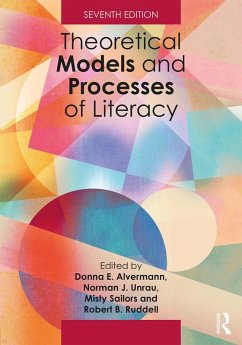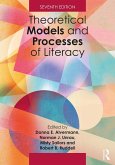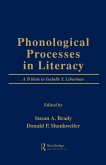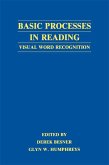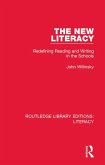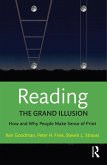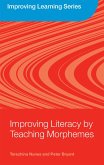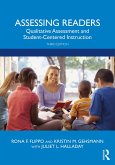Theoretical Models and Processes of Literacy (eBook, ePUB)
Redaktion: Alvermann, Donna E.; Ruddell, Robert B.; Sailors, Misty; Unrau, Norman J.
121,95 €
121,95 €
inkl. MwSt.
Sofort per Download lieferbar

61 °P sammeln
121,95 €
Als Download kaufen

121,95 €
inkl. MwSt.
Sofort per Download lieferbar

61 °P sammeln
Jetzt verschenken
Alle Infos zum eBook verschenken
121,95 €
inkl. MwSt.
Sofort per Download lieferbar
Alle Infos zum eBook verschenken

61 °P sammeln
Theoretical Models and Processes of Literacy (eBook, ePUB)
Redaktion: Alvermann, Donna E.; Ruddell, Robert B.; Sailors, Misty; Unrau, Norman J.
- Format: ePub
- Merkliste
- Auf die Merkliste
- Bewerten Bewerten
- Teilen
- Produkt teilen
- Produkterinnerung
- Produkterinnerung

Bitte loggen Sie sich zunächst in Ihr Kundenkonto ein oder registrieren Sie sich bei
bücher.de, um das eBook-Abo tolino select nutzen zu können.
Hier können Sie sich einloggen
Hier können Sie sich einloggen
Sie sind bereits eingeloggt. Klicken Sie auf 2. tolino select Abo, um fortzufahren.

Bitte loggen Sie sich zunächst in Ihr Kundenkonto ein oder registrieren Sie sich bei bücher.de, um das eBook-Abo tolino select nutzen zu können.
The Seventh Edition of this foundational text represents the most comprehensive source available for connecting multiple and diverse theories to literacy research, broadly defined, and features both cutting-edge and classic contributions from top scholars. Additional archival essays from previous editions are available on the book's webpage.
- Geräte: eReader
- mit Kopierschutz
- eBook Hilfe
- Größe: 7.67MB
Andere Kunden interessierten sich auch für
![Theoretical Models and Processes of Literacy (eBook, PDF) Theoretical Models and Processes of Literacy (eBook, PDF)]() Theoretical Models and Processes of Literacy (eBook, PDF)121,95 €
Theoretical Models and Processes of Literacy (eBook, PDF)121,95 €![Phonological Processes in Literacy (eBook, ePUB) Phonological Processes in Literacy (eBook, ePUB)]() Phonological Processes in Literacy (eBook, ePUB)110,95 €
Phonological Processes in Literacy (eBook, ePUB)110,95 €![Basic Processes in Reading (eBook, ePUB) Basic Processes in Reading (eBook, ePUB)]() Basic Processes in Reading (eBook, ePUB)59,95 €
Basic Processes in Reading (eBook, ePUB)59,95 €![The New Literacy (eBook, ePUB) The New Literacy (eBook, ePUB)]() John WillinskyThe New Literacy (eBook, ePUB)33,95 €
John WillinskyThe New Literacy (eBook, ePUB)33,95 €![Reading- The Grand Illusion (eBook, ePUB) Reading- The Grand Illusion (eBook, ePUB)]() Kenneth GoodmanReading- The Grand Illusion (eBook, ePUB)39,95 €
Kenneth GoodmanReading- The Grand Illusion (eBook, ePUB)39,95 €![Improving Literacy by Teaching Morphemes (eBook, ePUB) Improving Literacy by Teaching Morphemes (eBook, ePUB)]() Terezinha NunesImproving Literacy by Teaching Morphemes (eBook, ePUB)50,95 €
Terezinha NunesImproving Literacy by Teaching Morphemes (eBook, ePUB)50,95 €![Assessing Readers (eBook, ePUB) Assessing Readers (eBook, ePUB)]() Rona F. FlippoAssessing Readers (eBook, ePUB)51,95 €
Rona F. FlippoAssessing Readers (eBook, ePUB)51,95 €-
-
-
The Seventh Edition of this foundational text represents the most comprehensive source available for connecting multiple and diverse theories to literacy research, broadly defined, and features both cutting-edge and classic contributions from top scholars. Additional archival essays from previous editions are available on the book's webpage.
Dieser Download kann aus rechtlichen Gründen nur mit Rechnungsadresse in A, B, BG, CY, CZ, D, DK, EW, E, FIN, F, GR, HR, H, IRL, I, LT, L, LR, M, NL, PL, P, R, S, SLO, SK ausgeliefert werden.
Produktdetails
- Produktdetails
- Verlag: Taylor & Francis eBooks
- Seitenzahl: 640
- Erscheinungstermin: 3. Oktober 2018
- Englisch
- ISBN-13: 9781351616522
- Artikelnr.: 57915484
- Verlag: Taylor & Francis eBooks
- Seitenzahl: 640
- Erscheinungstermin: 3. Oktober 2018
- Englisch
- ISBN-13: 9781351616522
- Artikelnr.: 57915484
- Herstellerkennzeichnung Die Herstellerinformationen sind derzeit nicht verfügbar.
Donna E. Alvermann is the University of Georgia Appointed Distinguished Research Professor of Language and Literacy Education, and holds the Omer Clyde and Elizabeth Parr Aderhold Professorship in Education at the University of Georgia, USA. Norman J. Unrau is Professor of Education Emeritus at California State University, Los Angeles, USA. Misty Sailors is Professor of Literacy Education and Director of the Center for the Inquiry of Transformative Literacies at the University of Texas at San Antonio, USA. Robert B. Ruddell is Professor Emeritus at the University of California at Berkeley, USA.
Part 1: Historical 1. Literacies and Their Investigation Through Theories
and Models 2. Reading Research and Practice Over the Decades: A Historical
Analysis 3. Waves of Theory Building in Writing and its Development, and
their Implications for Instruction, Assessment, and Curriculum 4. Marie M.
Clay's Theoretical Perspective: A Literacy Processing Theory Part 2:
Cognitive and Sociocognitive 5. Reading as a Situated Language: A
Sociocognitive Perspective 6. The DRIVE Model of Reading: Deploying Reading
in Varied Environments 7. Role of the Reader's Schema in Comprehension,
Learning, and Memory 8. To Err Is Human: Learning About Language Processes
by Analyzing Miscues 9. Dual Coding Theory: An Embodied Theory of Literacy
10. Revisiting the Construction-Integration Model of Text Comprehension and
Its Implications for Instruction 11. A Sociocognitive Model of
Meaning-Construction: The Reader, the Teacher, the Text, and the Classroom
Context 12. The Role of Motivation Theory in Literacy Instruction 13.
Educational Neuroscience for Reading Researchers Part 3: Sociocultural 14.
Toward a More Anatomically Complete Model of Literacy Development: A Focus
on Black Male Students and Texts 15. Play as the Literacy of Children:
Imagining Otherwise in Contemporary Childhoods 16 New Literacies: A
Dual-Level Theory of the Changing Nature of Literacy, Instruction, and
Assessment Part 4: Critical 17. Regrounding Critical Literacy:
Representation, Facts and Reality 18 A Relational Model of Adolescent
Literacy Instruction: Disrupting the Discourse of "Every Teacher a Teacher
of Reading" 19. Positioning Theory 20. Gender IdentityWOKE: A Theory of
Trans*+ness for Animating Literacy Practices 21. Untapped Possibilities:
Intersectionality Theory and Literacy Research 22. Re-imagining Teacher
Education Part 5: Looking Back, Looking Forward 23. The Transactional
Theory of Reading 24. Transactional Reading in Historical Perspective 25.
Multilanguaging and Infinite Relations of Dependency: Re-theorizing Reading
Literacy from Ubuntu 26. Advancing Theoretical Perspectives on
Transnationalism in Literacy Research 27. The Social Practice of Multimodal
Reading: A New Literacy Studies-Multimodal Perspective on Reading 28.
Enacting Rhetorical Literacies: The Expository Reading and Writing
Curriculum in Theory and Practice 29. Propositions from Affect Theory for
Feeling Literacy through the Event 30. Pragmatism [not just] Practicality
as a Theoretical Framework in Literacy Research
and Models 2. Reading Research and Practice Over the Decades: A Historical
Analysis 3. Waves of Theory Building in Writing and its Development, and
their Implications for Instruction, Assessment, and Curriculum 4. Marie M.
Clay's Theoretical Perspective: A Literacy Processing Theory Part 2:
Cognitive and Sociocognitive 5. Reading as a Situated Language: A
Sociocognitive Perspective 6. The DRIVE Model of Reading: Deploying Reading
in Varied Environments 7. Role of the Reader's Schema in Comprehension,
Learning, and Memory 8. To Err Is Human: Learning About Language Processes
by Analyzing Miscues 9. Dual Coding Theory: An Embodied Theory of Literacy
10. Revisiting the Construction-Integration Model of Text Comprehension and
Its Implications for Instruction 11. A Sociocognitive Model of
Meaning-Construction: The Reader, the Teacher, the Text, and the Classroom
Context 12. The Role of Motivation Theory in Literacy Instruction 13.
Educational Neuroscience for Reading Researchers Part 3: Sociocultural 14.
Toward a More Anatomically Complete Model of Literacy Development: A Focus
on Black Male Students and Texts 15. Play as the Literacy of Children:
Imagining Otherwise in Contemporary Childhoods 16 New Literacies: A
Dual-Level Theory of the Changing Nature of Literacy, Instruction, and
Assessment Part 4: Critical 17. Regrounding Critical Literacy:
Representation, Facts and Reality 18 A Relational Model of Adolescent
Literacy Instruction: Disrupting the Discourse of "Every Teacher a Teacher
of Reading" 19. Positioning Theory 20. Gender IdentityWOKE: A Theory of
Trans*+ness for Animating Literacy Practices 21. Untapped Possibilities:
Intersectionality Theory and Literacy Research 22. Re-imagining Teacher
Education Part 5: Looking Back, Looking Forward 23. The Transactional
Theory of Reading 24. Transactional Reading in Historical Perspective 25.
Multilanguaging and Infinite Relations of Dependency: Re-theorizing Reading
Literacy from Ubuntu 26. Advancing Theoretical Perspectives on
Transnationalism in Literacy Research 27. The Social Practice of Multimodal
Reading: A New Literacy Studies-Multimodal Perspective on Reading 28.
Enacting Rhetorical Literacies: The Expository Reading and Writing
Curriculum in Theory and Practice 29. Propositions from Affect Theory for
Feeling Literacy through the Event 30. Pragmatism [not just] Practicality
as a Theoretical Framework in Literacy Research
Part 1: Historical 1. Literacies and Their Investigation Through Theories
and Models 2. Reading Research and Practice Over the Decades: A Historical
Analysis 3. Waves of Theory Building in Writing and its Development, and
their Implications for Instruction, Assessment, and Curriculum 4. Marie M.
Clay's Theoretical Perspective: A Literacy Processing Theory Part 2:
Cognitive and Sociocognitive 5. Reading as a Situated Language: A
Sociocognitive Perspective 6. The DRIVE Model of Reading: Deploying Reading
in Varied Environments 7. Role of the Reader's Schema in Comprehension,
Learning, and Memory 8. To Err Is Human: Learning About Language Processes
by Analyzing Miscues 9. Dual Coding Theory: An Embodied Theory of Literacy
10. Revisiting the Construction-Integration Model of Text Comprehension and
Its Implications for Instruction 11. A Sociocognitive Model of
Meaning-Construction: The Reader, the Teacher, the Text, and the Classroom
Context 12. The Role of Motivation Theory in Literacy Instruction 13.
Educational Neuroscience for Reading Researchers Part 3: Sociocultural 14.
Toward a More Anatomically Complete Model of Literacy Development: A Focus
on Black Male Students and Texts 15. Play as the Literacy of Children:
Imagining Otherwise in Contemporary Childhoods 16 New Literacies: A
Dual-Level Theory of the Changing Nature of Literacy, Instruction, and
Assessment Part 4: Critical 17. Regrounding Critical Literacy:
Representation, Facts and Reality 18 A Relational Model of Adolescent
Literacy Instruction: Disrupting the Discourse of "Every Teacher a Teacher
of Reading" 19. Positioning Theory 20. Gender IdentityWOKE: A Theory of
Trans*+ness for Animating Literacy Practices 21. Untapped Possibilities:
Intersectionality Theory and Literacy Research 22. Re-imagining Teacher
Education Part 5: Looking Back, Looking Forward 23. The Transactional
Theory of Reading 24. Transactional Reading in Historical Perspective 25.
Multilanguaging and Infinite Relations of Dependency: Re-theorizing Reading
Literacy from Ubuntu 26. Advancing Theoretical Perspectives on
Transnationalism in Literacy Research 27. The Social Practice of Multimodal
Reading: A New Literacy Studies-Multimodal Perspective on Reading 28.
Enacting Rhetorical Literacies: The Expository Reading and Writing
Curriculum in Theory and Practice 29. Propositions from Affect Theory for
Feeling Literacy through the Event 30. Pragmatism [not just] Practicality
as a Theoretical Framework in Literacy Research
and Models 2. Reading Research and Practice Over the Decades: A Historical
Analysis 3. Waves of Theory Building in Writing and its Development, and
their Implications for Instruction, Assessment, and Curriculum 4. Marie M.
Clay's Theoretical Perspective: A Literacy Processing Theory Part 2:
Cognitive and Sociocognitive 5. Reading as a Situated Language: A
Sociocognitive Perspective 6. The DRIVE Model of Reading: Deploying Reading
in Varied Environments 7. Role of the Reader's Schema in Comprehension,
Learning, and Memory 8. To Err Is Human: Learning About Language Processes
by Analyzing Miscues 9. Dual Coding Theory: An Embodied Theory of Literacy
10. Revisiting the Construction-Integration Model of Text Comprehension and
Its Implications for Instruction 11. A Sociocognitive Model of
Meaning-Construction: The Reader, the Teacher, the Text, and the Classroom
Context 12. The Role of Motivation Theory in Literacy Instruction 13.
Educational Neuroscience for Reading Researchers Part 3: Sociocultural 14.
Toward a More Anatomically Complete Model of Literacy Development: A Focus
on Black Male Students and Texts 15. Play as the Literacy of Children:
Imagining Otherwise in Contemporary Childhoods 16 New Literacies: A
Dual-Level Theory of the Changing Nature of Literacy, Instruction, and
Assessment Part 4: Critical 17. Regrounding Critical Literacy:
Representation, Facts and Reality 18 A Relational Model of Adolescent
Literacy Instruction: Disrupting the Discourse of "Every Teacher a Teacher
of Reading" 19. Positioning Theory 20. Gender IdentityWOKE: A Theory of
Trans*+ness for Animating Literacy Practices 21. Untapped Possibilities:
Intersectionality Theory and Literacy Research 22. Re-imagining Teacher
Education Part 5: Looking Back, Looking Forward 23. The Transactional
Theory of Reading 24. Transactional Reading in Historical Perspective 25.
Multilanguaging and Infinite Relations of Dependency: Re-theorizing Reading
Literacy from Ubuntu 26. Advancing Theoretical Perspectives on
Transnationalism in Literacy Research 27. The Social Practice of Multimodal
Reading: A New Literacy Studies-Multimodal Perspective on Reading 28.
Enacting Rhetorical Literacies: The Expository Reading and Writing
Curriculum in Theory and Practice 29. Propositions from Affect Theory for
Feeling Literacy through the Event 30. Pragmatism [not just] Practicality
as a Theoretical Framework in Literacy Research
